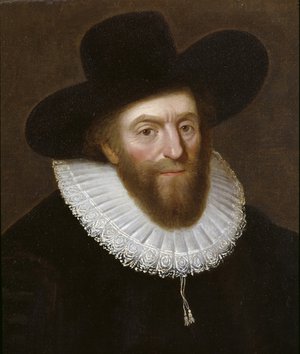Philip Henslowe (c. 1555-1616)
Theatrical financier and court servant, Philip Henslowe was the owner of the Rose Playhouse (in use principally from 1587-1600) where Christopher Marlowe’s most popular plays—including Doctor Faustus and Tamburlaine the Great—were performed. In addition to the Rose, Henslowe was part-owner of two later playhouses, the Fortune (1600) and the Hope (1613), the latter of which doubled as a bear-baiting arena. As was typical of entrepreneurs during the period, Henslowe’s business investments were diverse, ranging from starch-making to rental properties; for a time he also ran a pawn-broking business.
As a theatrical financier Henslowe supported several acting companies, most notably the Lord Admiral’s Men (later re-titled the Prince’s-Palsgrave’s Men). Alongside his son-in-law, the actor Edward Alleyn, Henslowe supplied funding for the purchase of play texts, costumes, and stage properties, and he also paid licensing fees to the Master of the Revels. Consequently, Henslowe’s well-known diary (Dulwich MSS 7)—an account book spanning the period from 1593-1603—provides an unprecedented glimpse into the theatrical world of its time.
Henslowe’s court positions—first as a Groom of the Chamber under Queen Elizabeth I and later, as Sewer (i.e., steward) to King James I—brought him into the realm of some prominent patrons of theatrical companies, including Charles Howard, the Lord Admiral, and George Carey, the Lord Chamberlain and patron of Shakespeare’s company. Doubtless, such contacts also helped the players’ cause as they struggled to maintain a professional presence in London where they were under constant censure from the local authorities. Moreover, Henslowe’s court contacts were probably of use in 1604 when he and Alleyn finally acquired the patent for the lucrative Mastership of the Bulls, Bears, and Mastiff Dogs, an office they had been seeking for some time.
Despite the fact that the acting companies occupying the Theatre and Globe playhouses have traditionally been conceived of as competition for the Rose and Fortune, Henslowe and Alleyn did not always conduct their theatrical affairs in a realm separate from others. In fact, there is much evidence to suggest the opposite—that Henslowe and Alleyn would certainly have been acquainted with William Shakespeare and other members of the Lord Chamberlain’s-King’s Men. In June, 1594, when the playhouses were closed owing to plague, the Lord Chamberlain’s Men performed briefly along with the Admiral’s Men at a theatre in Newington Butts, located just south of the City. Here, amongst the lists of plays commonly associated with the Admiral’s Men, Henslowe recorded three performances—of “hamlet” (9 June), “the tamynge of A shrowe” (11 June), and “[Titus] andronicous” (12 June)—which bear a marked similarity to the titles of Shakespeare’s plays. Also, Ben Jonson, whose plays are frequently associated with the Chamberlain’s-King’s Men, was paid by Henslowe and the Admiral’s Men in June 1602 to write a play called “Richard crockbacke” (based on the history of Richard III). Not least of all, the Henslowe-Alleyn families and William Shakespeare lived, for years, in Southwark where Henslowe and Alleyn were well known, not only for their many business investments, but because both held local offices as churchwardens in St. Saviour’s parish and governors of the parish school.
Philip Henslowe died in 1616, leaving a substantial estate to Agnes, his wife of many years. When Agnes died, just a year later, the estate passed to Agnes’s daughter Joan and her husband Edward Alleyn. Over time, it became absorbed into the foundation Alleyn established in 1619—The College of God’s Gift at Dulwich—now known as Dulwich College.

Edward Alleyn
Edward Alleyn (1566-1626)
Edward Alleyn was an English actor, entrepreneur, and the founder of Dulwich College. He was born in London, the son of a prominent innholder and porter to the Queen. His older brother, who acted for a short time, was servant to Lord Sheffield. By 1586 Edward was a player with the Earl of Worcester’s Men. Two years later, Alleyn and his brother were joint-owners of playbooks and various theatrical properties. By 1592, Alleyn was lauded as one of the greatest actors of his time, his reputation being largely earned through his performances in Christopher Marlowe’s plays. Alleyn certainly performed the roles of Tamburlaine and Doctor Faustus, and he probably also played Barabas in The Jew of Malta. Known primarily as a tragedian, Alleyn’s style was powerful and charismatic.
Alleyn’s financial investments were largely, but not wholly, in the area of the entertainment business. Together with his business partner and father-in-law Philip Henslowe (owner of the Rose Playhouse), Alleyn helped to manage the Lord Admiral's Men during the early 1590's. Alleyn may also have managed the Rose in Henslowe's absence, and both men co-owned the Fortune and Hope playhouses and the Bear Garden. In 1604 Alleyn and Henslowe also acquired the patent for the Mastership of the Bears, Bulls, and Mastiff Dogs, which Alleyn enjoyed until his death. Alleyn also held property in London, Middlesex, Southwark, and Dulwich. By 1606 he had purchased Dulwich Manor on which he constructed an orphanage and pensioner’s home called ‘The College of God’s Gift at Dulwich’. The formal ceremony for the founding of the college took place in September, 1619. The foundation deed was signed by some very prominent persons of the day, including the Archbishop of Canterbury.
Alleyn’s first wife was Joan Woodward, Henslowe’s stepdaughter, whom he married in 1592. Upon her death in 1623 Alleyn married Constance Donne, the daughter of John Donne, the poet and Dean of St. Paul’s Cathedral. In 1626, he wrote a will leaving his entire estate to Dulwich College. Alleyn had no children by either wife. At the time of his death Alleyn was the most prominent actor-entrepreneur of his age. His social contacts included many leaders of the church and government, including Francis Bacon, Sir Julius Caesar, and Lancelot Andrews.
For futher information, see the entries for Henslowe and Alleyn by S. P. Cerasano in the Oxford Dictionary of National Biography.